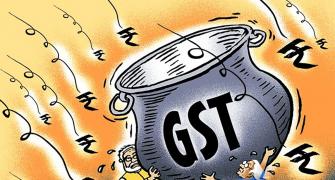 Govt might have to pare Rs 60,000 crore (Rs 600 billion) worth of holdings in 30 companies in three years.
Govt might have to pare Rs 60,000 crore (Rs 600 billion) worth of holdings in 30 companies in three years.
Having successfully implemented the 25 per cent free-float norm for private companies, the Securities and Exchange Board of India now wants the government to pare its holdings in public-sector undertakings to below 75 per cent.
According to sources familiar with the developments, the securities market regulator has already written to the finance ministry proposing the minimum public shareholding be raised from 10 per cent to 25 per cent, to level the playing field.
The regulator is likely to set a three-year timeframe for PSUs to meet the 25 per cent MPS requirement to avoid crowding out.
“The matter has been discussed with finance ministry officials and will be presented to the new finance minister shortly,” said a person with direct knowledge of the development.
At present, there are about 30 PSUs with government holdings of more than 75 per cent.
By current market rates, nearly Rs 60,000 crore worth of stake would have to be offloaded by the government in these companies to meet Sebi’s higher MPS requirement.
The government will have to sell Rs 36,371 crore (Rs 363.71 billion) worth of shares in Coal India to bring down promoter holding from 89.65 per cent to 75
Some of the other major companies where the Centre holds more than 75 per cent stake are NMDC, NHPC, SAIL and MMTC.
Sources indicated the final discussion on the matter could take time, as the finance ministry would consult other ministries before accepting Sebi’s proposal.
The deadline for 25 per cent MPS requirement for private companies had ended in June last year, while the deadline for the government to pare its holding to at least 90 per cent in PSUs was August 2013.
The public-float requirement had come into play in June 2010, after Sebi amended the Securities Contract (Regulations) Act.
The regulator had taken action against more than 100 private companies, their promoters and directors for failing to achieve the 25 per cent public float within the stipulated period.
Almost all PSUs had managed to meet the 10 per cent public-float requirement before their August deadline.
However, Sebi had allowed the government to transfer its holding in excess of 90 per cent in ‘sick PSUs’ to a special fund.
The rationale for having at least 25 per cent public float is to curb stock price manipulation and to promote wider participation from investors.










